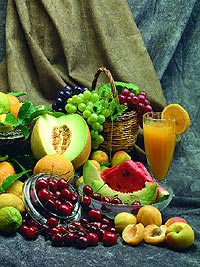Oranges are typical winter crops widely produced in various parts of Crete. 19th century travellers on Crete extolled their rich taste and large consumption. When oranges are in season, they are purchased in large quantities by families and are consumed raw or squeezed for juice. Oranges are particularly rich in vitamin C, while vitamin B12 is distinguished for its hematopoietic action, and vitamins A, C and E for their antioxidant properties.
That which distinguishes the Cretan diet from any other type of Mediterranean diet is the significantly higher requirements for fruit consumption. It has been estimated (A. Keys, 1970 and D. Kromhout, 1989) that the average Cretan consumes four times more fruit than the average southern European and six times more than the northern European (e.g. the average Dutch).
Oranges are typical winter crops widely produced in various parts of Crete. 19th century travellers on Crete extolled their rich taste and large consumption. When oranges are in season, they are purchased in large quantities by families and are consumed raw or squeezed for juice. Oranges are particularly rich in vitamin C, while vitamin B12 is distinguished for its hematopoietic action, and vitamins A, C and E for their antioxidant properties.
Again, tradition plays a major role in the cultivation of citrus crops. The trees are completely adjusted to the temperate climate of the island and produce fruit of excellent taste. Processing units (mainly for orange and citrus juice) are modern with methods that balance harmoniously international standards and tradition. Grapes are the par excellence fruit of the summer season and considered ideal for a balanced diet. As mentioned earlier, the antioxidant elements contained in their skin protect against cancer while other trace elements are indispensable for the good operation of the human body. The grapes grown on Crete are distinguished from those grown elsewhere in the Mediterranean for their excellent aroma and taste. In recent years we have witnessed the extensive cultivation of special traditional varieties, which are free from pips and, therefore, can safely be consumed even by little children.
Greek mythology says that Gaea (the goddess of earth) gave Zeus and Hera citrus fruit as wedding presents. These presents were guarded in the Garden of Hesperides, far from the inquisitive eyes of mortals. Today, citrus crops are cultivated widely in the province of Chania, while others can be found in the valley of Messara, at Fodele (Heraklion area), at Mylopotamos, and elsewhere.
| < Prec. | Succ. > |
|---|







